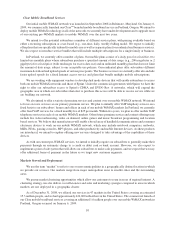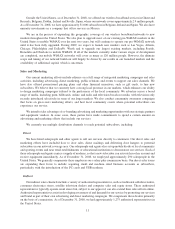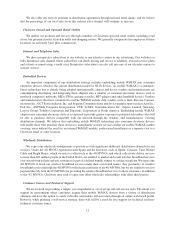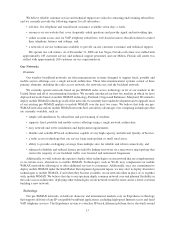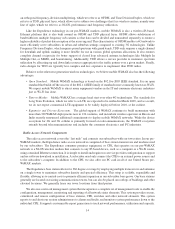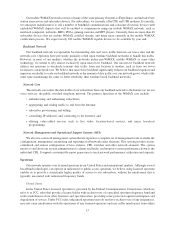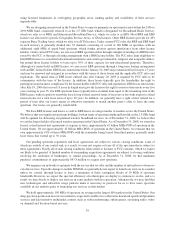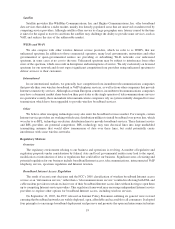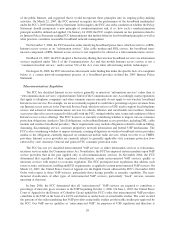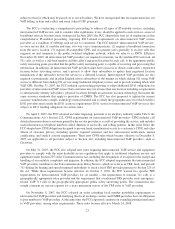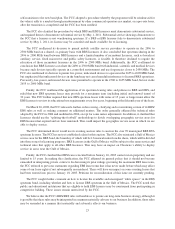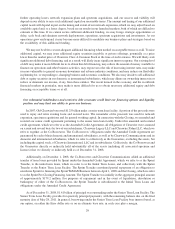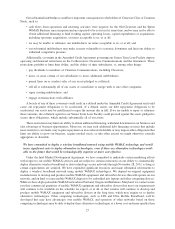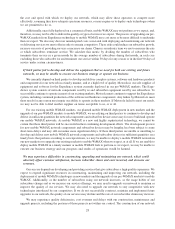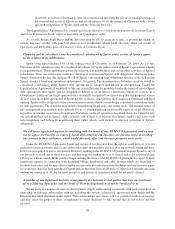Clearwire 2008 Annual Report Download - page 32
Download and view the complete annual report
Please find page 32 of the 2008 Clearwire annual report below. You can navigate through the pages in the report by either clicking on the pages listed below, or by using the keyword search tool below to find specific information within the annual report.o
f
t
h
epu
bli
c Internet, an
d
suggeste
d
t
h
at
i
t wou
ld i
ncorporate t
h
ese pr
i
nc
i
p
l
es
i
nto
i
ts ongo
i
ng po
li
cy-ma
ki
n
g
activities. On March 22, 2007, the FCC initiated an inquir
y
into the performance of the broadband marketplac
e
under the FCC’s 200
5
Internet Policy Statement. In this inquiry, the FCC also seeks comment on whether the Polic
y
S
tatement s
h
ou
ld i
ncorporate a new pr
i
nc
i
p
l
eo
f
non
di
scr
i
m
i
nat
i
on an
d
,
if
so,
h
ow suc
h
a non
di
scr
i
m
i
nat
i
o
n
p
rinciple would be defined and applied. On Januar
y
14, 2008, the FCC sou
g
ht comment on two petitions related t
o
i
ts Internet Po
li
cy Statement see
ki
ng FCC
d
eterm
i
nat
i
ons t
h
at
f
urt
h
er
d
e
fi
ne
i
ts
f
our
b
roa
db
an
d
pr
i
nc
i
p
l
es as we
ll
a
s
w
h
at pract
i
ces const
i
tute reasona
bl
e
b
roa
db
an
d
networ
k
management.
On November 7, 200
6
, the FCC issued an order classif
y
in
g
broadband power lines, which we refer to as BPL,
Internet access service as an “information service.” Like cable modem and DSL service
,
the broadband trans
-
mi
ss
i
on component o
f
BPL Internet access serv
i
ce
i
s not requ
i
re
d
to
b
eo
ff
ere
d
as a te
l
ecommun
i
cat
i
ons serv
i
ce
.
On March 23, 2007, the FCC adopted a Declarator
y
Rulin
g
that wireless broadband services are information
s
erv
i
ces regu
l
ate
d
un
d
er T
i
t
l
eIo
f
t
h
e Commun
i
cat
i
ons Act an
d
t
h
at mo
bil
e Internet access serv
i
ce
i
s not
a
“
commerc
i
a
l
mo
bil
e serv
i
ce,” un
d
er sect
i
on 332 o
f
t
h
e Act, even w
h
en o
ff
ere
d
us
i
n
g
mo
bil
e tec
h
no
l
o
gi
es.
On Au
g
ust 20, 2008, the FCC released an enforcement order findin
g
that under the specific facts of a complain
t
before it, a certain network management practice of a broadband provider violated the 2005 Internet Polic
y
S
tatement.
T
e
l
ecommunications Re
g
u
l
ation
Th
e FCC
h
as c
l
ass
ifi
e
d
Internet access serv
i
ces
g
enera
lly
as
i
nterstate “
i
n
f
ormat
i
on serv
i
ces” rat
h
er t
h
an as
“
telecommunications services” re
g
ulated under Title II of the Communications Act. Accordin
g
l
y
, man
y
re
g
ulations
th
at app
l
ytote
l
ep
h
one compan
i
es an
d
ot
h
er common carr
i
ers current
l
y
d
o not app
l
y to our w
i
re
l
ess
b
roa
db
an
d
Internet access service. For example, we are not currentl
y
required to contribute a percenta
g
eof
g
ross revenues fro
m
our Internet access services to the Universal Service Fund, which we refer to as USF, used to su
pp
ort local tele
p
hon
e
s
erv
i
ce an
d
a
d
vance
d
te
l
ecommun
i
cat
i
ons serv
i
ces
f
or sc
h
oo
l
s
, lib
rar
i
es an
d
rura
lh
ea
l
t
h
care
f
ac
ili
t
i
es. Interne
t
access providers also are not required to file tariffs with the FCC, settin
g
forth the rates, terms and conditions of thei
r
Internet access service offerin
g
s. The FCC, however, is currentl
y
considerin
g
whether to impose various consume
r
p
rotect
i
on o
bli
gat
i
ons, s
i
m
il
ar to T
i
t
l
eIIo
bli
gat
i
ons, on
b
roa
db
an
d
Internet access prov
id
ers,
i
nc
l
u
di
ng DSL, ca
ble
m
o
d
em an
d
w
i
re
l
ess
b
roa
db
an
d
prov
id
ers. T
h
ese requ
i
rements ma
yi
nc
l
u
d
eo
blig
at
i
ons re
l
ate
d
to trut
h
-
i
n-
billi
n
g,
s
lammin
g
, discontinuin
g
service, customer proprietar
y
network information and federal USF mechanisms. Th
e
FCC is also considering whether to impose automatic roaming obligations on wireless broadband service provider
s
si
m
il
ar to t
h
eo
blig
at
i
ons current
ly i
mpose
d
on commerc
i
a
l
mo
bil
era
di
o serv
i
ces, w
hi
c
h
we re
f
er to as CMRS
,
p
rov
id
ers. Internet access prov
id
ers are current
ly
su
bj
ect to
g
enera
lly
app
li
ca
bl
e state consumer protect
i
on
l
aw
s
e
nforced by state Attorneys General and general FTC consumer protection rules.
Th
e FCC
h
as not
y
et c
l
ass
ifi
e
di
nterconnecte
d
VoIP serv
i
ces as e
i
t
h
er
i
n
f
ormat
i
on serv
i
ces or te
l
ecommu
-
ni
cat
i
ons serv
i
ces un
d
er t
h
e Commun
i
cat
i
ons Act. Nonet
h
e
l
ess, t
h
e FCC
h
as
i
m
p
ose
d
certa
i
n man
d
ates u
p
on VoIP
s
ervice providers that in the past applied onl
y
to telecommunications services. In November 2004, the FC
C
d
eterm
i
ne
d
t
h
at regar
dl
ess o
f
t
h
e
i
r regu
l
atory c
l
ass
ifi
cat
i
on, certa
i
n
i
nterconnecte
d
VoIP serv
i
ces qua
lif
ya
s
i
nterstate serv
i
ces w
i
t
h
respect to econom
i
cre
g
u
l
at
i
on. T
h
e FCC preempte
d
state re
g
u
l
at
i
ons t
h
at a
dd
ress suc
h
i
ssues as entr
y
certification, tariffin
g
and E911 requirements, as applied to certain interconnected VoIP services. O
n
Marc
h
21, 2007, t
h
eUn
i
te
d
States Court o
f
Appea
l
s
f
or t
h
eE
i
g
h
t
h
C
i
rcu
i
ta
ffi
rme
d
t
h
e FCC’s Novem
b
er 2004
O
rder with respect to these VoIP services, particularl
y
those havin
g
portable or nomadic capabilit
y
. The
j
uris-
dictional classification of other t
y
pes of interconnected VoIP services, particularl
y
“fixed” services, remain
s
uncerta
i
natt
hi
st
i
me
.
I
n June 200
6
, the FCC determined that all “interconnected” VoIP services are re
q
uired to contribute a
p
ercenta
g
e of interstate
g
ross revenues to the USF be
g
innin
g
October 1, 200
6
. On June 1, 2007, the United States
Court o
f
Appea
l
s
f
or t
h
eD
i
str
i
ct o
f
Co
l
um
bi
aC
i
rcu
i
tup
h
e
ld
t
h
e FCC’s or
d
er t
h
at
i
nterconnecte
d
VoIP prov
id
er
s
c
ontribute to the USF on the basis of a
6
4.
9
% safe harbor or on the basis of actual traffic studies. The court vacated
th
e port
i
ons o
f
t
h
eor
d
er man
d
at
i
n
g
t
h
at VoIP prov
id
ers us
i
n
g
tra
ffi
c stu
di
es
g
et t
h
e tra
ffi
c stu
di
es pre-approve
dby
t
he FCC. Our VoIP service qualifies as “interconnected VoIP” for purposes of USF regulation and therefore is
20


